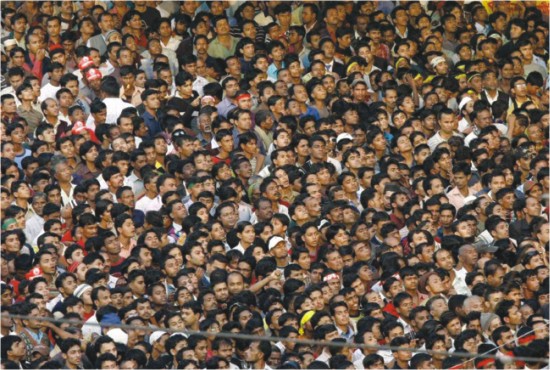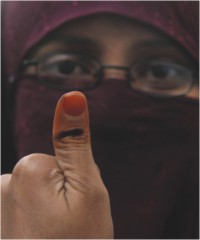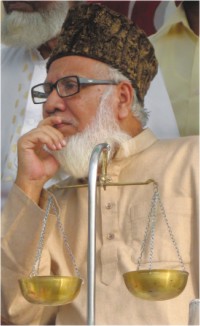
Inside
|
Getting Beyond a Thousand Days Farid Bakht With the humiliation of Jamaat, it looks like we are in for a hundred days of rejoicing and remembrance. Without wishing to spoil the festivities, however, let me pose the question: could we be in need of some reflection, too? Let us consider that since Dhaka's political elite lives at the beck and call of a clutch of embassies and aid missions, it would be remiss not to consider what is being discussed in those circles, behind closed doors. After all, we could be forgiven for feeling a little underwhelmed by the sudden outpouring of support by diplomats for this triumph of democracy. Many of the same upstanding individuals were cheerleaders for the military's foray into politics.
They gave diplomatic cover for the "interim" administration and were knee-deep in its gestation, planning, and implementation. We should be thankful that like so many so-called home-grown technocrats, they read the game wrongly. What concerns me is that their replacements might think they can go one better next time. By next year, much of the Bengali middle class will likely be suffering from amnesia, as if the last two years hadn't happened. That will not be the case for many an embassy official. The project may have failed for now, but the thinking and objectives are unlikely to wither away. If the milestones and timescales have slipped, is it not possible that some may consider that a battle has been lost but the war still goes on? As in Pakistan, they have always been lukewarm about true democracy in Bangladesh, and at best prefer a "managed democracy." The post-Soviet Union "pro-democracy" 1990s were an aberration, not the rule. Those getting carried away with comparison to the days of Liberation in the winter of 1971 should be reminded that the sky seemed the limit then too. The foreign forces were in utter disarray and out for good, apparently. Who would have thought in January 1972 that only 1,300 days later the victors would be so comprehensively defeated and see the rehabilitation of the cohorts of Nizami and his unrepentant war criminal cronies? The coup of 1975 was initiated by the same forces as had overthrown Allende in Chile two years before. They did not give up in 1972 in South Asia. The political officers and "station chiefs" merely made some new assessments about the changed circumstances and methodically plotted a new project. The champions of democracy We should never forget that some of the same people were more than happy to sign an accord with the Islamic Khelafat Majlis to gain the religious vote. That accommodation with reactionary religious forces is a common thread through the history of both the Awami League and BNP. The fear of a vast and imaginary religious vote bank unites the high command of both parties. It is little use saying this election was a "victory for secularism" because voters have always rejected the Jamaat et al. This is nothing new. Voters have been doing so for several elections. The politicians were not listening. The rich, urban politicians are so busy shuttling between embassies that they are out of touch with rural and small town Bangladesh. We have to wait and see if this new administration is really willing to "go all the way" and change the face of national and regional politics. This may be a task beyond the ambitions of a party which must be pinching itself about the extent of its majority and the percentage of the vote. If it had really been confident, it would never have allied with an ex-dictator, who did more than most in rehabilitating the same religious forces that are apparently in the firing line today.
While we should all wish the best for a freely and fairly elected new regime, we should think with our heads, rather than with our hearts. To get back to our Western diplomats, let us remind ourselves about their agenda. They view India as the pre-eminent power in the region. So long as Delhi remains in its current orbit, the role of Bangladesh is to play the role of an "enlightened Muslim state," prepared to vote "the right way" at the UN, send tens of thousands soldiers abroad when required, and slot into a globalised world i.e. allow its gas and coal resources to be extracted at minimal cost and export cheap textiles and manpower. Allowing foreign control of its ports and its banking sector would be regarded as a bonus. When the BNP also won its own huge majority in 2001, one of the first things its new finance minister did was to proclaim that it would export gas to India because it had overwhelming power in parliament. Within a few months, Saifur Rahman had to eat his words and resort to playing the clown for the rest of his reign. Energy multi-nationals, aid officials, and politicians got a sharp lesson on the limits of parliamentary power. This time, diplomats will not over-estimate the durability of 230 plus MPs. They felt that the "Two Ladies" had had their time in "holding back" Bangladesh and gave their nod to the soft coup and the creation of a new NGO-party. Only well into 2008, did they concede they would have to temporarily abandon their model. They wanted the removal of the Two Ladies. Perhaps they see one as being out of the picture now. Will they really change 180 degrees for the other? Economics Dhaka's elite are walking into this depression blind-folded. They do not foresee a foreign exchange crisis, as seen in Pakistan. They have not planned for a crash in remittances from West Asia as the crumbling oil price puts a stop to infrastructure construction. They see the garments sector prevail over East Asian competition forever and think that they have solved the labour unrest problem permanently. While the deflationary drop in world oil and food prices will provide a temporary fillip, it will be dwarfed by these issues. After a honeymoon early in 2009, the numbers will look horrendous in 2010. The nail in the coffin of the previous regime was its economic mismanagement. Too many of the middle class welcomed the anti-democratic shenanigans because they thought they would witness an economic revival and a "cleansing" of political corruption. Only with the failure of the "technocrats" in curbing food price rises and producing electricity, did the regime unravel.
It is a tall order to expect that the new faces will necessarily do any better. To survive, they will have to. I am not convinced they have any definitive plan. Throwing out a thin "manifesto" a few days before the polls showed their lack of preparedness. Do we need to remind ourselves that our elite continues to cede economic sovereignty to the World Bank and its cronies? Are we really expecting the new regime to change course in a meaningful way? Much has been made about the contest between the old and new guard. We should not get ageist. Tarique Rahman and his Hawa Bhaban gang should have proven beyond any doubt that replacing old corrupt leaders with new, not-so-pretty young things only leads to worse government. The question is: will the new guns be prepared to offer radical leadership in a new direction? They had the chance to offer us a vision the last 24 months but failed to do so. I know there are a few bright individuals who could do a good job but there is no sign they will be given a free hand. The population was not mobilised around a new message about national economic sovereignty. The voters wanted to give a black eye to autocratic rule and also to the previous BNP-Jamaat alliance for its failures. So while the votes are impressive, the support can easily melt away if structural improvements are not made quickly. If the country is beset in a long-drawn out economic crisis, by 2011 the electorate's mood will darken. The regime will then be vulnerable. Will it be able or willing to "deliver" to Western interests? If it is perceived as being too friendly to them and also to Delhi, will it not invite a backlash? If it is too strident in standing up to foreign powers, will not the diplomats again look to interfere? Can we be sure that they won't? The real contest will turn to economics. Whether the regime survives more than a thousand days will be determined by what it has done for farmers, landless labourers, and the millions of unemployed and under-employed young generation. The challenge may be insurmountable, on our current trajectory. The chances of a return to autocratic rule around 2012 are higher than we think. On the back of widespread breakdown of law and order amid economic failure, I would not so readily dismiss that scenario. Farid Bakht is a political analyst. |


